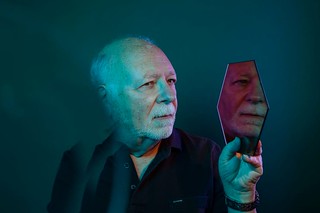
PREV ARTICLE
NEXT ARTICLE
FULL ISSUE
PREV FULL ISSUE
VIRTUAL HUMANS IN THE FUTURE OF NUMISMATICS?A vision of the may-be-here-sooner-than-you-think future was presented in a Washington Post article yesterday. Here's an excerpt. There's no numismatic connection, but wouldn't if be interesting to have a conversation with numismatic figures of the past? -Editor
If all goes according to plan, future generations will be able to interact with him using mobile devices or voice computing platforms such as Amazon’s Alexa, asking him questions, eliciting stories and drawing upon a lifetime’s worth of advice long after his physical body is gone. For decades, Silicon Valley futurists have sought to unchain humanity from the corporeal life cycle, viewing death as yet another transformational problem in need of a “life altering” solution. What began with the cryonics movement, in which bodies are frozen for future resuscitation, has intensified amid the rise of digital culture. Today, a new generation of companies is hawking some approximation of virtual immortality –– the opportunity to preserve one’s legacy online forever. HereAfter was co-founded by Sonia Talati, who calls herself a personal legacy consultant, and James Vlahos, a California journalist and conversational-AI designer who is best known for creating a software program called the Dadbot. Brought to life after Vlahos learned that his father was dying of cancer, the Dadbot allows him to exchange text and audio messages with a computerized avatar of his late father, conversing about his life as well as hearing songs, small talk and jokes. Once the Dadbot became widely known, Vlahos received so many requests to create memorializing bots for other people that he decided an untapped market for making virtual people was primed for the mainstream. “It took my mom two years to remove the answering-machine message with my dad’s voice from their home phone,” Vlahos said. “She didn’t want to extinguish his voice, and that’s something I’ve heard from other people. But it’s almost comical that we’re still relying on such a primitive method to hear the voices of our loved ones after they’re gone.” I was already aware of the work of James Vlahos from earlier reading, and am not surprised that many people approached him about immortalizing their own loved ones. For years we've only known numismatic figures of the past through their writings and those of others. Video and audio recordings came along, but were widely scattered before the advent of the internet and sites like the Newman Numismatic Portal. This would be a logical next step, to add a degree of interactivity to what we know about those who have gone before us. Interesting concept. -Editor To read the complete article, see:
Coincidentally, the weekend Wall Street Journal has an article about "mind uploading", the next step along this futuristic path. -Editor Imagine a future in which a machine can scan your brain and migrate the essentials of your mind to a computer. It’s called mind uploading—preserving a person’s consciousness in a digital afterlife. As a neuroscientist, I’m convinced that mind uploading will happen someday. There are no laws of physics that stand in the way. It depends, however, on technology that has not yet been invented, so nobody knows when mind uploading might become available. To read the complete article, see:

Wayne Homren, Editor The Numismatic Bibliomania Society is a non-profit organization promoting numismatic literature. See our web site at coinbooks.org. To submit items for publication in The E-Sylum, write to the Editor at this address: whomren@gmail.com To subscribe go to: https://my.binhost.com/lists/listinfo/esylum All Rights Reserved. NBS Home Page Contact the NBS webmaster 
|
